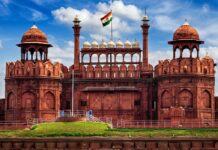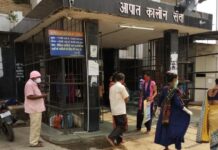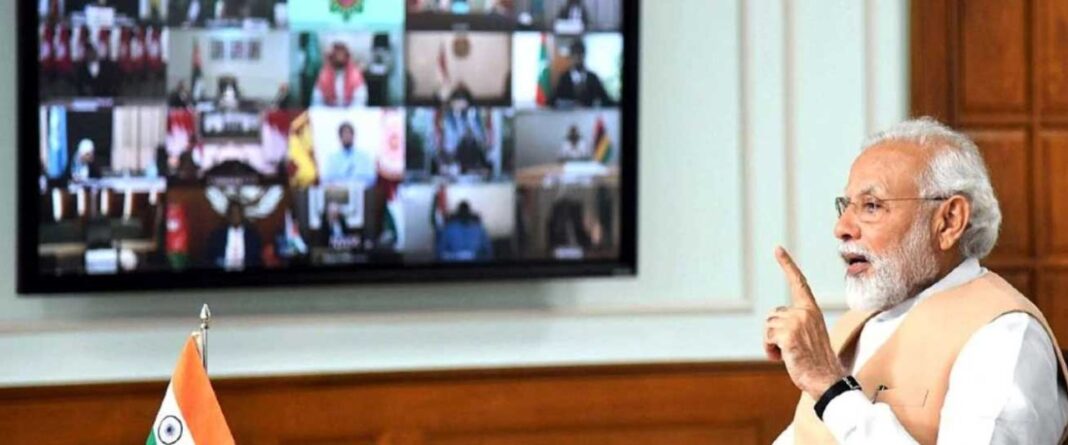Election after election keeps India in a state of perpetual war with itself. The chaos borne out from the political slugfests continued to bedevil the nation’s progress throughout its 70-odd years of history and still persists. Intermittent elections at punchayat, municipal, state and parliamentary levels keep our political class in an election mode all the time, so much so that they are left with little time for governance.
Political parties flaunt their electoral prowess during polls to belittle each other while the common man remains a passive spectator with no clue to the high voltage drama enacted for him. Crores are spent on every election, be it panchayat, state or parliamentary level. The chaos and confusion and even violence that take place on a large scale are a staple of these elections.
Could the framers of our constitution have anticipated what would happen in the country in the name of democracy? Is Indian democracy collapsing under its own weight, or is it part of the natural progression of a democracy? These are the relevant questions that need to be answered and put things in the right perspective.
Next year (2022), we would be completing 75 years of our Independence. The government is expected to organise elaborate programmes to celebrate the occasion. But the moot point is that would ‘we the people have enough reasons to celebrate.
The Indian constitution though survived more than 100 times (104 times till January 2020), has failed to retain its spirit. It seems to be nobody’s concern that the Indian brand of federalism, the edifice on which our plural democracy rest, is in duress. The Centre behaves like a big brother and the state governments are left with no option but to be content with playing the second fiddle to the Union government. Nonetheless, the states keep raising the banner of revolt that keeps the cauldron simmering.
Of late, the tussle between the Centre and the states has become a running commentary. Of late, there has been a no-holds-barred war of attrition with the Centre on the one hand and the states on the other. This is because a large number of states are ruled by parties other than the one at the Centre.
While the Centre is always out to usurp powers of the states, the states are always ready to demand their pound of flesh. However, more often than not the Centre gets its will imposed on the states. And this disturbs the equation between the two.
While this tug-of-war between the Centre and states started much early, in the last six years it has been intensified. Ever since the BJP-led National Democratic Alliance headed by Prime Minister Modi has come to power at the Centre in 2014, it has been undermining the autonomy of the states which is a hallmark of federalism.
The states under non-BJP governments have been complaining of the Centre’s highhandedness. The Central government bulldozing its agenda is not going down well with the states.
To be fair to the incumbent government at the Centre, the trend is not new. In the past too, the Central governments tried to make states subservient to the Centre as it has more elbow room constitutionally. But never in the past, it was as blatant as we see now. Not that the Constituent Assembly wanted stronger provinces, but it struck a fine balance between the Centre and the states.
Even Prime Minister Nehru had gone on record saying a weak Centre does not augurs well for the country. Even so, the states were made all-powerful in their given domain. The cliché goes that India is a country with unity in diversity. Its ethnic, linguistic, religious and cultural diversity calls for a decentralised political system, a system that could take into account regional aspirations.
The Constituent Assembly under the stewardship of Baba Bheem Rao Ambedkar saw India as a ”Union of states”, and not as a Western-style federation. While the states do not have the right to secede, they are supreme in their own domains. Their areas of operation were clearly demarcated.
While the Central and the state lists well define the legislative powers of the Centre and the state governments, both can make laws under the concurrent list of the constitution. It is here that the Centre has gone for overkill encroaching on the areas of states’ jurisdiction conveniently ignoring local aspirations. The Centre irrespective of the party in power quite often seen to be discriminatory towards Opposition-ruled states.
As long as the same party is in power both at the Centre and in a state, there won’t be any power tussle between the two as was seen till the late sixties when the Congress was in power both at the Centre as well as many states. Once Congress lost its ground in the states, things started changing gradually but drastically.
Late Indira Gandhi, as prime minister, had no qualms about dismissing the state governments at whim. She would go on replacing any state government with the president’s rule on some pretext or the other with utter disregard for the majority. It changed the political milieu of the country. The trend that was set by her in the sixties continued till date and is getting ever more spiteful with every passing day.
The coronavirus outbreak brought in its wake a chill in the Centre-state relations. It exposed the fault lines in the federal structure of our constitution. Having been discredited for failure to handle the situation arising from the catastrophic pandemic, the Central government sought to grab all the credit due for everything done to curb corona while squarely blaming the states for mismanagement.
The onus for the disruption in the vaccination campaign was also passed on to the states by none other than Prime Minister Narendra Modi himself. Ironically, there were no vaccines made available by the Centre to the states. The states of Maharashtra and Delhi were at the receiving end of the Centre’s diatribe. Both the states complained of discrimination in the distribution of vaccines, oxygen and life-saving drugs by the Centre.
While the BJP-ruled states got more than their share, the non-BJP ruled states were projected as callous and insensitive. Gautam Gambhir, the BJP MP from Delhi, was offering free Febflu. Devendra Fednavis, the ex-chief minister of Maharashtra was accused of hoarding Remdesivir. These medicines were not readily available to the states.
The historic electoral success of the BJP has weakened the bargaining power of the states. Prime Minister Modi’s popularity has left the states at the mercy of the Centre. In the face of a weak Opposition at the Centre, many state governments are asserting themselves in defence of their constitutional rights and privileges.
A recent development in Delhi may prove a harbinger of the states’ weakening position. Till recently, Chief Minister Arvind Kejriwal had all the powers to govern Delhi with an exception of law and order, land, and a few other jurisdictions. With simple legislation in Parliament, the Centre made it incumbent upon for the state government to seek Lieutenant Governor’s (LG) approval for every bill. The LG is a Centre’ appointee as the constitutional head of the state. Now, the Delhi government means the LG, officially. The wings of the Delhi chief minister have been clipped once and for all. This is a severe blow to the spirit of federalism.
Changing the rules of the game while the game is on… Does it not amount to cheating? The vengeance with which the Centre is imposing its hegemony on the states has gone too far. A political defeat is made good by judicial overkill. Many states where the BJP lost went on to claim power despite being defeated at the hustings. The story was repeated in Goa, Karnataka, Uttarakhand, the list goes on. The obsession to grab power amounts to stealing the people’s vote. The UT of Puducherry, Jammu-Kashmir, and Ladakh have been deprived of their autonomy, on one pretext or the other.
It is not only the BJP at the Centre but the state governments are also going berserk. Recently, the Haryana legislature passed a law directing employers to reserve 75 per cent of jobs for locals, a move to appease Jats. The move will promote regionalism and obstruct the free flow of labour. It may also cause a rift between different regions. It would make a country within a country.
In Bihar, overzealous legislators even threatened national security as the Nitish Kumar led NDA Government passed a controversial police bill that gives extra-constitutional powers to the police. It’s no secret that the law is passed to rein in the Opposition. Though a political tool, it can have serious repercussions for the state as the cops are now able to arrest and jail any Opposition leader without a warrant or judicial oversight. The law gives the police overriding impunity on the grounds of acting in the interest of the state. But it could lead to an armed conflict with the national and police force of another state. It could even engage in crossfire with armed police of other states. Last year, there were violent clashes at the border between the states of Assam and Mizoram. The BSF was sent to restore the order.
There is a tendency on the part of the Centre to impose itself on states. The states, on a high of power, in turn, are passing unconstitutional laws. Such incidents undermine the health of the nation and could even tear it apart. Federalism means cohesion where respect for the rights and powers of one another is a must. India needs to strike a fine balance between its various governments that operate at different levels to become a robust democracy. Most states have been created along cultural and linguistic lines. A balance of power would ensure Centre-state harmony and, in turn, a viable Union.
The Centre-state relations today are in the abyss. Rising social and religious tensions; civil unrest, public disenchantment due to inflation, loss of jobs etc. all these issues need to be addressed on an urgent basis. Do we need to add political and constitutional chaos to the burden on the nation? The Prime Minister is quite used to pour out his frustrations when he was a chief minister with what he called the overbearing Centre. It is time he rectified what he used to criticise once rather than change the very edifice of the Indian Union to suit his own interests.
Disclaimer: We do undertake rigorous checks on content provided by contributors before publishing the same. If you come across some factual errors, kindly bring this into our notice and we shall review your objection and claim as per our policy and display correction credits and corrections on the article itself.
The opinion expressed in the article is of the writer. Writer is a freelance journalist/journalist based in Delhi




























